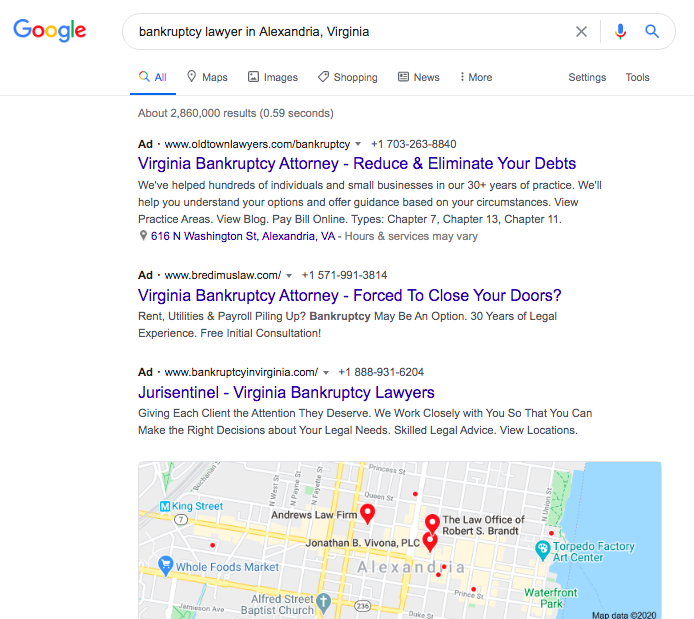On the first page of your Google search, this might be the first thing you see…

There are websites on the topmost portion of the search engine results page that have a small “Ad” in them. This means that they are paid ads, which means that law firms have paid money to Google so that they can be seen first when a user searches a specific keyword on their search engine and when they are clicked, these law firms pay Google through a specific budget they have set aside for that campaign.
Paying search engines or social media platforms whenever your ad is clicked is called Pay Per Click Advertising (PPC).
Why Do Companies Engage in PPC Advertising?
As a user yourself, you can see many advertisements when you go on social media websites or even on other third-party websites, aside from Google. Companies have seen the impact of PPC advertising and invest big money in keeping their websites on top of search engine results and expanding their reach to more of their target audience. So what are the specific benefits of running a PPC ad campaign?
- It provides instant and consistent web traffic
Since you are paying for your ad campaign to be run on these platforms, you will see an increase in traffic immediately after launching your campaign. At the same time, if you planned out your budget correctly for the campaign, you maintain a steady stream of paid traffic throughout your campaign’s run.
- It increases your law firm’s brand awareness
Unlike the usual organic search traffic that companies did before in order to be on top of Google’s search results pages, PPC allows you to pay your way into expanding your reach to your audience. When you use paid ads, the time it takes to increase your website traffic is a lot less compared to organic traffic.
- It allows you to define your specific target audience
Regardless of the platform, you can choose the specific types of people who can view your PPC campaigns. This, in turn, helps you reach your ideal customer and excludes the people who do may not need your services. This can be done by using the right keywords in your campaign or based on specific attributes, like where they’re from, what’s their age range, and what kind of social class they’re in.
When you run your campaign, the more specific you are with your target audience, the higher your chances of success will be.
- It’s easy to adjust your PPC campaigns
Unlike before wherein billboards and TV commercials were hard to adjust and you had to pay large sums of money to keep your ad visible, the Internet and PPC advertising allow you easily set and change your budget, update or replace your advertisement, and/or extend your campaign if you want to. And it cost a lot less than what you would pay billboards or TV stations to run your campaign.
With all the benefits in mind, you might already be planning out how you can take advantage of PPC. Of course, it’s best that you educate yourself on how it works on various platforms, too.
How Does PPC Advertising Boost Your Brand Engagement on Various Platforms?
Pay-per-click advertising (PPC) is actually a really broad category as many platforms offer companies the opportunity to run advertising campaigns for many users to see. But the most specific categories that you can be used to segregate these methods would be Google Ads and Social Media Advertising.
Google PPC Ads
Google actually has several types of paid ads you can use to run your campaigns. This includes Search Ads, Local Search Ads, Display Ads, and Remarketing. When a user clicks your ad, you pay Google the current Cost Per Click (CPC) from the budget you have set. When the budget has run out, Google will stop running your ads, too.
So why should you invest in Google PPC ads? According to Clutch.co, 33% of users click on paid search ads because it directly answers their search queries. And so far, the numbers are expected to grow. With that, having your own local law firm,you must take advantage of being immediately present on the first page of search engine results, so you can get the web traffic that you want.
Types of Google Ads
- Search Ads
This is one of the most commonly known PPC advertisements. If someone searches for your product or services on Google’s search engine, then your ad will be the first thing they see. When they click on your ad, that will be the time wherein you will pay for it.
You can set up your Search Ad campaign by simply coming up with your own ad copy, find the appropriate keywords you want to be shown for, and then set your daily budget. Of course, there’s more to it in setting up your ad campaign, so you can get the most out of your investment. There’s lots of research and planning involved, so you can reach your specific target audience and gain the website traffic and revenue you want.
- Local Search Ads
These are a specialized subset of the PPC search ads, which focuses on targeting users that are looking for services within your area. Similar to the search ads, these are on a cost-per-click basis.

If you are the type of business that only serves a specific area, then customizing your location targeting using Local Search Ads may be the best way for you to get your return on investment (ROI). You can also learn more about Local Search and Google My Business by reading our previous article.
- Display Ads
These are not your typical pay-per-click model as the process is more streamlined. The ads that you will create can be developed to display in millions of websites and apps. You simply have to create your ad based on your chosen format, choose your specific target audience, and then determine your budget. You can choose from a variety of payment options for your campaign, like cost-per-click (CPC), cost-per-thousand-impression (CPM), and cost-per-acquisition (CPA). Of course, choosing your payment option should depend on your ad campaign’s goal.
However, know that setting a budget does not mean that your ad will display immediately. Instead, each of your ad placements has its own automated auction for each payment auction. The winner is automatically charged the minimum amount necessary to outrank the next advertiser when the ad is played. Hence, using displayed ads can be tricky and requires the right strategy in order to get the desired outcome you want.
- Retargeted Ads
And lastly, these ads are shown to the people who have visited your law firm’s website in the past. They can be shown on the Display Network or presented as Search Ads. Furthermore, they are priced on an automatic bidding model; hence, like the Display Ads, you need to come up with the right budget strategy to get the outcome you want. If you want to know more about Retargeted Ads, you can also check out our previous article to learn more.
Social Media PPC Ads
Although Google Ads does have a broader reach, you can also benefit from social media PPC ads. Of course, for a law firm, you need to use platforms that will reach your target audience, mainly Facebook or LinkedIn.
- Facebook Ads
There are many ads available on Facebook and can vary in format and destination. You can also specify the people who can view your ads based on their demographic, interest, location, and the likes.
However, if you want to get most out of your Facebook Ads, you can install a Facebook pixel, which lets the platform gather data about visitors on your site. This way, you can identify common user behavior and use it in specifying your Facebook Ads.
Retargeting ads are also applicable to Facebook. So as mentioned earlier, when users visit your website, targeted ads related to your law firm will follow them on the platform.
Another way to expand your law firm’s reach on Facebook is to Boost Posts with a simple click of a button. This will convert your simple Facebook post into an advertisement, allowing you to specify your target audience and customize your budget, placement, and timeline.
- LinkedIn Ads
If you’re a law firm that wants to work with other businesses as well, then creating paid ads on LinkedIn will benefit you as well. You can use text-only ads, ads with images, or both! However, statistics show that ads with images can generate 20% more clicks. And then, you identify your target audience by segmenting them by company, skills, demographics, job title, and the likes. Your PPC ads will be displayed at the side or bottom of the user’s LinkedIn homepage or in their inbox.
Another way to advertise on LinkedIn would be through Sponsored Content wherein your ad will show up in your audience’s newsfeed. With this, you simply have to set your bid, and you have the option to choose your payment, whether it’s cost-per-click (CPC) or cost-per-thousand-impressions (CPM).
With all this, knowing the types of PPC ads and how it can benefit you, do you think using PPC ads to boost your law firm’s online visibility is worth your money?
Yes, but this will depend on how much time and effort you will put into committing to the campaign. Like every effective marketing strategy, it needs comprehensive planning and knowing the latest updates in SEO and social media management. Acquiring traffic also takes time (but a lot less time than organic traffic). You need to put the work into making your paid campaign visible to your target audience in every platform that you choose.
If you don’t, then a PPC campaign won’t get the Return of Investment you want from your marketing campaign. An ineffective PPC campaign will only drain your budget.
Don’t have the time to create your own effective PPC campaign? Then perhaps you can seek help from online marketing professionals to get the job done for you.
How Our Team at Binary Ideas Can Help You
At Binary Ideas, we have PPC experts who can help you optimize your website traffic through PPC ads in various platforms, whether it’s Google or social media. Our professionals will work with you in coming up with an effective plan for advertising your law firm, so you can acquire more website traffic, and ultimately a return on investment (ROI).
We see to it that you get value for your money when you invest in PPC advertising and our services.
Get in touch with us today to learn more about PPC advertising and about our other online marketing services.








